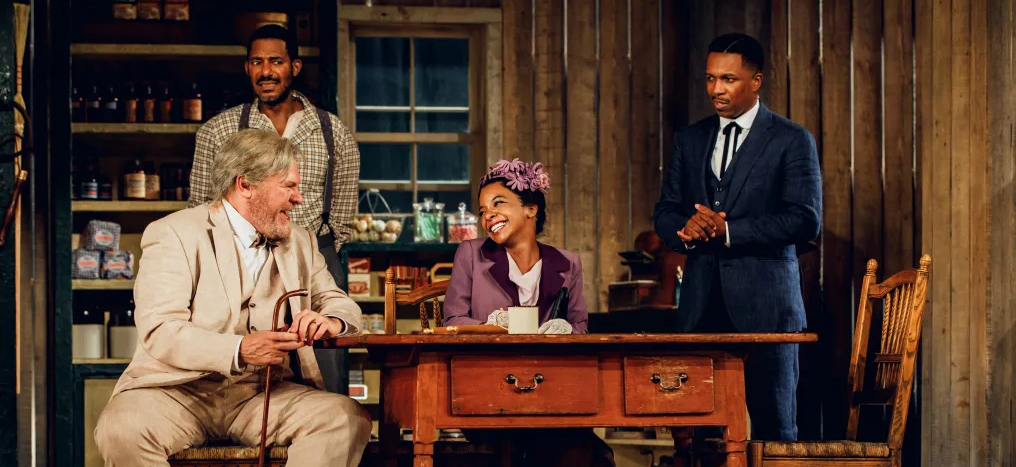PURLIE VICTORIOUS
A Non-Confederate Romp Through the Cotton Patch
by Ossie Davis
Directed by Kenny Leon
Starring Leslie Odom, Jr
Music Box Theatre
Official Website
Reviewed by David Spencer
It’s not a totally unknown phenomenon, but it’s one that never fails to fascinate me: the way in which an especially hip and insightfully written play can seem in revival as if it was written only within the last decade, or as if its dialogue has been goosed for contemporaneousness, when in fact all of it was written many decades previous. In the case of Purlie Victorious, by Ossie Davis, in revival at the Music Box Theatre, it has been 62 years since the debut.
However, Purlie Victorious also walks a fine line. Pur-loining its plot description from Wikipedia (summarizing the mirror-structure 1970 musical, Purlie), interpolating current cast in parens: it’s “set in an era when Jim Crow laws still were in effect in the American South. Its focus is on the dynamic traveling preacher Purlie Victorious Judson (Leslie Odom, Jr.), who returns to his small Georgia town hoping to save Big Bethel, the community’s church, and emancipate the cotton pickers who work on the plantation of oppressive Ol’ Cap’n Cotchipee (Jay O. Sanders). With the assistance of Lutiebelle Gussie Mae Jenkins (Kara Young), soon to be his fiancé, Purlie hopes to pry loose from Cotchipee an inheritance due the long-lost cousin she’ll impersonate, and use the money to achieve his goals.”
At this point it’s prudent to note the play’s subtitle: A Non-Confederate Romp Through the Cotton Patch. Davis clearly means to poke fun at familiar African American tropes and Southern plantation types—the charismatic priest, the seemingly lazy schemer, the mama figure, the enthusiastic pigtail girl—but to flip them into dominance, with Ol’ Cap’n as the last bulwark of an unsustainable racial class system. And to “romp” among them dances with reinforcing them in a manner that negates the satire. There can be no more clear demonstration of this than the 1963 film version featuring most of the original cast, including author Davis in the title role, with his real-life spouse Ruby Dee as his fiancé, Godfrey Cambridge as the layabout, and Beah Richards as the matriarch…each of them a perfect realization of archetype. Plus, also from the original cast, Sorrell Booke—his Ol’ Cap’n anticipating his fame as Boss Hogg (Dukes of Hazzard), a blustery white fool in authority—and Alan Alda as his put-upon, sympathetic son; the good white man.
It’s not that the film intentionally yokels it up; but that it’s not much of a filmic experience. For its director, Nicholas Martin (best known for Santa Claus Conquers the Martians) doesn’t do anything to dial back the performances for the camera. Everybody (and none more than Mr. Booke) is still playing to be heard in the balcony. And this tips the balance. (Said tipping, remember, a mere two years after the original Broadway production had closed.) Problem aside from lack of cinematic style is that this particular script is needful of an audience to “get it” and share in the jokes—conspiratorially, as it were. And there can be no more clear demonstration of that than the 1981 video of the musical Purlie, in which actors on a stage performing live make all the difference. Of course, Purlie has a rousing, audience-pleasing score to seal the deal. To go back to the unmusicalized script in 2023 risks disinterring a sensibility past its sell-by date.
And, you know…in a politically and racially less fraught time…it might have. But with the Forces of Stupid rising up again to try reclaiming its hold on the Followers of Stupid—and largely, tragically, succeeding at it—Purlie Victorious is about as fresh as it can be, because its rebelliousness is needed all over again.
Comparing the new production to the film’s evidence of the original one, the variance is minor. There’s not much point in putting a spin on a spin, and wisely, director Kenny Leon doesn’t, not in the staging nor in the casting. Leslie Odom Jr. is a rousing Purlie, and as a colleague of mine noted, he makes audience energy and reaction surge as if the event were a revivalist meeting.
As to a few of the others, there’s a wee bit of fine-tuning for contemporary sensibility. When Kara Young’s Lutibelle takes over to (justifiably) pull the wool over Ol’ Cap’n’s eyes, she’s more than just an ingenue enjoying her mischief—she’s a young woman digging the power of center stage and making sure everybody knows it. Billy Eugene Jones, as Purlie’s brother Gitlow isn’t in the layabout, Stepin Fetchit mode actor Godfrey Cambridge originally parodied; he’s a somewhat more energetic opportunist.
The most profound alteration, though, and I think perhaps the wisest one, is in the casting of Ol’ Cap’n. In all previous Broadway iterations of the play, original and musical, Ol’ Cap’n is a credible obstacle to overcome, but portrayed (and lampooned) as the quintessential petty tyrant: a small, feisty, explosive buffoon. But in this 2023 revival, the Cap’n is Jay O. Sanders. He’s a very tall, very big man. He doesn’t exactly downplay the Cap’n’s temper, but rather uses it as a natural conveyor of genuine menace. However much he may represent an unsustainable way of life, he’s its towering bulwark; and when he says a line like this one, disdaining his unbigoted son—
“Just last night, [my white cronies] was telling me this son of mine made himself a full-fledged speech. All about Negras—NeGROES he called ‘em—four years of college, and he still can’t say the word right…”
—it’s not so much 1961’s parody of stupidity as a 2023 take on the insistence of stupidity as seen daily on the news. Funny but authentically and actively Gang-of-Eight dangerous. And the added villainy raises the stakes even a bit higher.
Which, as I say, has a lot to do with why Purlie Victorious has taken hold again. It reminds us that the classics—not just classic plays, but classic battles—never get old…
